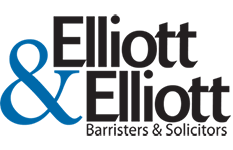 This blog focuses on some frequently asked questions associated with Expropriation Law in Ontario. It is aimed at helping homeowners to understand their general rights if they are ever faced with a situation that involves the expropriation of their land/property. Throughout this newsletter we will provide some insight into the expropriation procedure, and various courses of action that homeowners can take when faced with a situation involving expropriation in order to make the process go as smoothly as possible.
This blog focuses on some frequently asked questions associated with Expropriation Law in Ontario. It is aimed at helping homeowners to understand their general rights if they are ever faced with a situation that involves the expropriation of their land/property. Throughout this newsletter we will provide some insight into the expropriation procedure, and various courses of action that homeowners can take when faced with a situation involving expropriation in order to make the process go as smoothly as possible.
It is important to begin with some basic definitions that are commonly used when discussing expropriation. The following definitions are taken from the Ontario Expropriations Act, R.S.O. 1990, c E.26.
Expropriate: means the taking of land without the consent of the owner by an expropriating authority in the exercise of its statutory powers.
Expropriating Authority: means the Crown or any person empowered by statute to expropriate land.
Statutory Authority: means the Crown or any person empowered by statute to expropriate land or cause injurious affection.
Owner: includes a mortgagee, tenant, execution creditor, a person entitled to a limited estate or interest in land, a guardian of property, and a guardian, executor, administrator or trustee in whom land is vested.
What should you do if your property is being expropriated?
Expropriation involves the compulsory taking of your property by an Expropriating Authority. The power to expropriate includes all types of interests in land, not only the simple or total ownership, but also registered and unregistered easements and licenses. Expropriation is a right granted through federal or provincial statutes to Expropriating Authorities such as governments, universities, public utilities as well as to privately owned pipeline companies, and it involves situations where privately owned land is needed for public projects such as the building of roads, highways or schools.
When expropriation is considered necessary, the Expropriating Authority must offer the owner of the expropriated land a monetary amount that is considered fair in relation to the real market value. If a dispute arises in relation to the amount that is offered, the owner has the option to take the matter to the Ontario Municipal Board (“OMB”) in order to negotiate a settlement that is deemed appropriate.
Can I stop an expropriation?
Homeowners that are being forced to expropriate have the legislative right to object to the expropriation by requesting a Hearing of Necessity, however, it is rare for an owner to become successful at this stage. The stage at which owners are more commonly successful is at a Compensation Hearing where the amount paid by the Expropriating Authority can be challenged.
Can I simply sell my property rather than be expropriated?
Yes. The Expropriating Authority is legislatively required to attempt to negotiate the purchase of the property before any other action is taken. If the Expropriating Authority is unable to reach an agreement to purchase the property directly, the Expropriating Authority will proceed with a formal expropriation. The formal process is started by the Expropriating Authority serving a Notice of Intention to seek approval for the expropriation.
This is the point in which the landowner is entitled to request a Hearing of Necessity which theoretically safeguards the landowner’s interest as it requires the Expropriating Authority to prove that the land it is seeking to expropriate is reasonably necessary for the achievement of its objectives. This provides the landowner with an opportunity to challenge the Authority, and obtain proof that the proposed taking is fair. Although this does not stop the expropriation, it can stall the process.
A Board of Inquiry will be required to decide if the expropriation is necessary. If the owner does not request a hearing, or if the Board rules that expropriation is necessary in the interest of the general public, the matter proceeds to the approval stage. Once approved, a Plan of Expropriation is registered in the appropriate Land Registry Office and a Notice of Expropriation will be served.
If I object but the Board determines the property taking is necessary will I be paid?
Yes. Within 90 days of the registration of the Plan of Expropriation and prior to the Expropriating Authority taking possession of the property, the Expropriating Authority must serve an offer, referred to as a ‘Section 25 Offer’ on the landowner. A Section 25 Offer is an offer without prejudice. This means that the landowner is able to accept what is offered initially, and if they are unsatisfied with the amount then they are still able to dispute the amount offered, and make a claim for further compensation. The Section 25 Offer must be accompanied with an appraisal which shows how the compensation was allocated.
The Expropriations Act requires that the compensation paid must be based on the full and fair market value of the property, plus any amounts provided for injurious affection to the property owner.
How long do I have until the Expropriating Authority can acquire my land?
Typically, the quickest a property can be obtained by the Expropriating Authority is within 7 months if there is no Hearing of Necessity requested. Although the Expropriations Act suggests that they can acquire the land within 4 months, this is often not the case in practice. From the time that the Notice of Intention is received, until the date that the Expropriating Authority takes possession of the property usually takes approximately 9 – 12 months in total.
What do I do if I want to dispute the compensation paid?
You can commence a legal proceeding against the Expropriating Authority by filing a Notice of Arbitration and Statement of Claim with the OMB. The Expropriating Authority can, and likely will, defend the landowner’s claim by filing a Reply. At this point the matter will proceed in the same manner as a traditional lawsuit.
Who pays the legal costs?
When the matter proceeds to arbitration and the OMB makes an Order regarding the amount of compensation, the landowner can recover the legal, appraisal, and other related costs from the Expropriating Authority if the Board orders the Expropriating Authority to pay at least 85 percent of the amount offered when it made its Section 25 Offer of Compensation.
The Expropriating Authority can require that the costs be assessed, but the assessment is based on the standard of the costs as between the lawyer and his/her client which is the highest level available, also referred to as Full Indemnity. If a settlement is recorded without a compensation hearing, the landowners legal, appraisal, and other related costs almost always forms part of the settlement.
What compensation am I entitled too?
Under the Expropriations Act, there are four different types of claims that may be made. They are as follows:
- Fair market value for the property that was taken.
- Claims for injurious affection. This means the landowner can claim severance damage or reduction in value to the expropriated owners remaining property as a result of the construction or other public work that resulted from the expropriation. This type of claim is also made available in cases where the construction of a public work diminishes the value of the owners property.
- Disturbance damages. This means the losses, costs or expenses that were incurred by the owner due to the expropriation of his/her property as a result of inconvenience and dislocation.
- Business losses. If the expropriation affects a business then compensation may be provided, this also includes compensation for the loss of goodwill.
What does market value mean?
As previously discussed, the Expropriating Authority is responsible for compensating the landowner for the fair market value of the property that is being expropriated. The term ‘fair market value’ has often been disputed over the years by the Expropriating Authority and the owners, but a common definition was provided in the case Henderson v. Minister of Tourism:
Market value is defined herein as being the highest price in terms of money which a property would bring if exposed for sale on the open market, allowing a reasonable time to find a prudent, fully informed purchaser, buying with knowledge of all the uses to which the property could be adapted or is capable of being used, and purchasing from an equally prudent and informed vendor, with neither party acting under duress.
In relation to professional real estate appraisers in Ontario, market value is often defined as:
The most probable price which a property should bring in a competitive and open market under all conditions requisite to a fair sale, the buyer and seller each acting prudently and knowledgeably, and assuming the price is not affected by undue stimulus. Implicit in this definition is the consummation of a sale as of a specified date and the passing of title from seller to buyer under conditions whereby:
- There is motivation from the buyer and seller.
- Both parties are acting in what they believe is their best interest, and they are well informed and well advised.
- There has been a reasonable amount of time allotted for exposure in the open market.
- Cash in Canadian dollars is used for payment, or financial arrangements comparable thereto.
- The price is unaffected by special or creative financing or sales concessions granted by individuals associated with the sale. The price represents the normal consideration for the property sold.
What is injurious affection?
In the Expropriations Act, Section 1 defines injurious affection in relation to two different scenarios. The first is where a statutory authority acquires only part of the land from an owner, and the second is where the statutory authority does not acquire any land from the owner.
Injurious affection claims relating to the first situation, where only partial land is taken, involve claims where the acquisition and construction of the works, or use of the works, resulted in a reduction in market value of the owner’s land. Also, if any personal or business damages arise as a result of the expropriation, claims may be made for losses.
Where the statutory authority does not acquire any of the owner’s land, the owner can still make claims for any reduction in market value to their land, but the loss is limited to construction only, not the use. These claims are based on tort principles (i.e. trespass, nuisance and negligence) and they deal with the interference by the public authority with the owner’s use and enjoyment of his or her land.
The courts have set out the legal requirements which must be met for claims to succeed. The expropriated owner must prove the following:
- the damage must result from an act rendered lawful by statutory powers of the authority performing the act;
- the damage must be such as would have been actionable under the common law, but for the statutory powers exemption;
- the damage must be an injury to the land itself and not a personal injury to its owner or an injury to a business or trade; and
- the damage must be occasioned by the construction of the public work, and not by its use.
What are the tax implications of an expropriation?
The Income Tax Act, R.S.O. 1990, c I.2 contains provisions that are intended to mitigate or eliminate the immediate tax burden that is created as a result of expropriation. This is because it is understood that expropriation only affects a small portion of the population, and is not ordinarily requested or desired by the landowner. Due to this, parliament passed legislation aimed at providing relief from the immediate tax event that might otherwise result, in fairness to the taxpayers who must involuntarily dispose of their property as a result of the expropriation.
Expropriations are deemed to be a disposition of property so there are likely to be some adjustments of the undepreciated capital cost of fixed assets, and any income tax implications related to the recovery of business losses incurred. Taxes are payable on recapture of capital cost allowances, and business losses recovered as part of the compensation paid are taxable as income.
In relation to corporate taxes, there may be a claim made for tax liabilities which have been accelerated as a result of the expropriation. However, taxes payable on expropriation compensation are not normally claimable.
Finally, there may be property tax implications resulting from the relocation of a property from an area with lower property tax rates to an area with significantly higher property tax rates. In these circumstances, the increased property tax in the new location can be claimed by the owner as disturbance damages associated with the expropriation.
For information on the expropriation process view the “Expropriated Owners Flow Chart” created by the Ontario Expropriation Association. This chart outlines a step-by-step process which is followed in the event of an expropriation.
The content of this Blog is intended to provide a general guide to the subject matter. The information does not constitute legal advice and a solicitor and client relationship is not created.

 This blog focuses on some frequently asked questions associated with Expropriation Law in Ontario. It is aimed at helping homeowners to understand their general rights if they are ever faced with a situation that involves the expropriation of their land/property. Throughout this newsletter we will provide some insight into the expropriation procedure, and various courses of action that homeowners can take when faced with a situation involving expropriation in order to make the process go as smoothly as possible.
This blog focuses on some frequently asked questions associated with Expropriation Law in Ontario. It is aimed at helping homeowners to understand their general rights if they are ever faced with a situation that involves the expropriation of their land/property. Throughout this newsletter we will provide some insight into the expropriation procedure, and various courses of action that homeowners can take when faced with a situation involving expropriation in order to make the process go as smoothly as possible.
